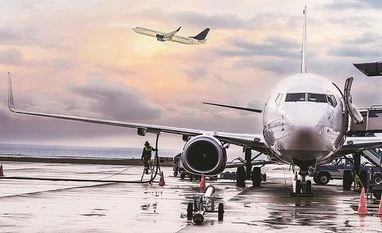A troika of festive travel, low fuel costs, and rupee appreciation may help IndiGo and SpiceJet to narrow their losses during the December quarter of FY21, say analysts. The recovery in earnings, however, may be capped by weak air fares, and stricter travel restrictions amid a new strain in coronavirus (Covid-19).
While most analysts remain divided on the quantum of loss incurred by domestic airlines during the quarter, they unanimously agree that the Indian aviation sector is on a slow but steady path to recovery.
“Average daily domestic passengers increased by almost 120 per cent from Q2FY21 to Q3FY21, partly due to seasonality factor. Yet, average daily passengers in December recovered to only 55 per cent versus last year despite the low fare environment,” noted analysts at global brokerage HSBC.
They expect InterGlobe Aviation-run IndiGo airline to report a net loss of Rs 837.6 crore during the quarter under review, while SpiceJet is expected to report a net loss of Rs 296.5 crore. Both these airlines had incurred a loss of Rs 1,194.8 crore and Rs 112.6 crore in the September quarter of FY21. In the year ago period, the airlines were profitable with PAT at Rs 490.5 crore and Rs 73.2 crore, respectively.
Back home, analysts remain rather bullish on the firms’ recovery. Edelweiss Securities, for instance, pegs IndiGo’s net loss at Rs 119.6 crore and that of SpiceJet is seen at Rs 31.8 crore. Operationally, aggregate Ebitdar (earnings before interest, tax, depreciation, amortization, and rental costs) is seen at Rs 2,003.2 crore, down 19 per cent on year from Rs 2,478.5 crore; but up a massive 127 per cent QoQ from Rs 883.7 crore.
“We forecast Q3FY21 aggregate EBITDAR to dip 19 per cent YoY led by 18 per cent YoY fall in passenger load factor (PLFs) as well as low fleet deployment, which would be partially offset by strong cost optimisation and some domestic demand recovery,” the brokerage said in its earnings preview report.
What may aid recovery?
During the three months to December, Brent crude prices declined 28 per cent YoY while domestic aviation turbine fuel (ATF) prices plunged 31 per cent YoY. This, analysts at Centrum Broking believe, should translate into continued savings in fuel costs for airlines. Additionally, the rupee has appreciated by 1 per cent sequentially against the US dollar, providing marginal relief in non-fuel costs like maintenance and lease rentals.
“Overall, we expect cost per available-seat kilometer (CASK) to reduce sharply from the September quarter led by better absorption of fixed costs due to improved traffic. Load factors, too, are likely to improve by 640 bps and 190 bps QoQ to 71.4 per cent and 77.5 per cent, respectively for IndiGo and SpiceJet driven by improved traffic,” the brokerage said.
Elara Capital, meanwhile, expects IndiGo and SpiceJet to report a decrease in yield by 16 per cent and 8 per cent, respectively on weakening in airfares amid concerns over the second mutant Covid-19 strain. This, they say, could be partially offset by an increase in domestic capacity to 70 per cent in November.
“However, revenue is likely to fall 58 per cent compared with previous year for IndiGo, and by 56 per cent YoY for SpiceJet, as operations are still not at pre-Covid levels and the passenger load factor (PLF) is currently around 72-77 per cent from 88-90 per cent levels last year,” it said in its earnings expectations note.
Analysts at the brokerage peg IndiGo’s revenue at Rs 4,146.4 crore for the period under study, down from Rs 9,931.7 crore reported in Q3FY20. Sequentially, however, the income may jump 51.3 per cent from Rs 2,741 crore reported in Q2FY21.
As regards SpiceJet, the revenue is seen at Rs 1,620.2 crore, relative to Rs 3,647.1-crore revenue posted in Q3FY20. In Q2FY21, the revenue stood at Rs 1,055 crore.
Unlock 30+ premium stories daily hand-picked by our editors, across devices on browser and app.
Pick your 5 favourite companies, get a daily email with all news updates on them.
Full access to our intuitive epaper - clip, save, share articles from any device; newspaper archives from 2006.
Preferential invites to Business Standard events.
Curated newsletters on markets, personal finance, policy & politics, start-ups, technology, and more.
)